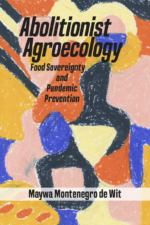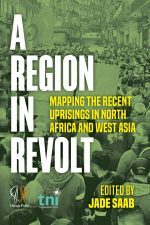COVID-19 has exposed the racialized nature of food systems, but also potentially grants opportunities to build anew. Maywa Montenegro explores a series of breakdowns, from fractured supply chains to uncontrolled infection among essential food workers to Black, Brown, and Indigenous communities scythed through by the virus along old grooves of race-class oppression. She traces the likely origins of COVID-19 to spillover sites forged by agroindustrial expansion into forested regions where pathogens spring free and infect humans. Industrial animal agriculture drives these ecological changes that incubate future outbreaks. Pandemics have their roots in the violent separation of communities from their territories, seeds, knowledge and wealth. Racism enables such theft as fundamental to capitalist expansion.
To tackle pandemics and food injustices, Montenegro calls for an abolitionist agroecology. No anti-capitalist alternative can ignore the racism that is central to the transnational industrial food system. Scholars including Angela Davis, Ruth Wilson Gilmore, and Mariame Kaba have argued that although abolition is frequently seen as an oppositional strategy — to eradicate, for example, prisons and police — abolition is equally propositional. An abolitionist agroecology cracks open multiple possibilities that respond to the exigencies of a pandemic planet — there is no ‘normal’ to which we can safely return.










Gabriel Kuhn
Besides prominent Black anarchists such as Lorenzo Kom’boa Ervin and Kuwasi Balagoon (whose main works – Anarchism and the Black Revolution and A Soldier’s Story: Revolutionary Writings by a New Afrikan Anarchist, respectively – have recently seen new editions), Atticus Bagby-Williams and Nsambu Za Suekama discuss radical Black theorists such as Frantz Fanon and Cedric Robinson. The engagement with the latter is of particular interest, as Robinson is mainly known for his work on Black Marxism. However, the subtitle of Robinson’s main work, Black Marxism: The Making of the Black Radical Tradition, suggests why Atticus Bagby-Williams and Nsambu Za Suekama would find it useful to relate Robinson’s studies to the emergence of Black anarchism. By doing so, they are making a very valuable contribution to the history of radical thought.
In their concluding chapter, “Toward Black Autonomy,” Atticus Bagby-Williams and Nsambu Za Suekama write that “contributions of Black anarchist politics will be vital towards building a more liberated post-capitalist world.” This, without doubt, is true. Track down a copy, read, and learn. — Gabriel Kuhn: LeftTwoThree https://lefttwothree.org/anarchism-and-the-black-radical-tradition/